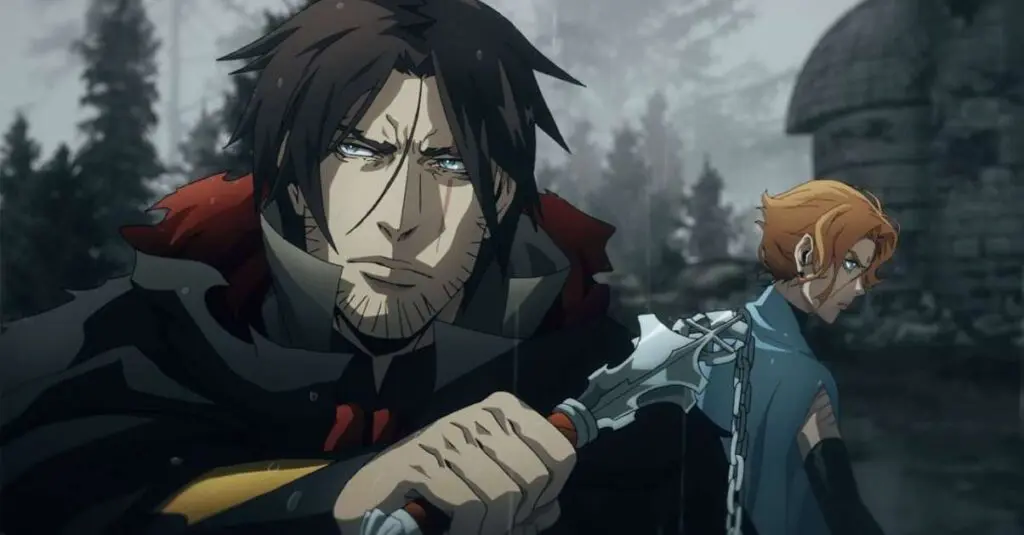Summary
For fans of the games, the show itself, and great storytelling in general, Castlevania Season 4 is must-see entertainment and a new rubric for how all good things should come to an end.
This review of Castlevania Season 4 is spoiler-free.
Being the best adaptation of a video game series is a bit like being the smartest person at a flat-earth conference, but I don’t want to sound like I’m damning with faint praise when I say that Netflix and Powerhouse Animation’s Castlevania might well be the best game-to-screen adaptation ever. I’ve thought that since the modest four-episode first season and continued to all throughout the much-improved second season and a third that even managed to get away with side-lining Dracula himself. After finishing Castlevania Season 4, the conclusion of the story (at least until Netflix finishes work on a planned spin-off set in the same universe), I was convinced of it.
And this final season had some lofty tasks ahead of it. It had to continue to adapt Konami’s beloved franchise in a way that pleased fans but didn’t alienate those only familiar with the show; it had to pay off four seasons and thirty-plus episodes of plot and character development; it had to deliver on bigger and better action and more poignant drama; and it actually had to end, which we always joke around here is something that Netflix shows find impossible to do. Consider me pleasantly surprised, then, that the season managed to do all of those things, and almost as if it wasn’t even trying.
Picking up not long after the third season’s bloody climax at Lindenfeld, the first couple of episodes function as revision for a complex series full of conflicting groups and ideologies, as well as an introduction to the new threads that’ll develop across these ten latest episodes. Trevor Belmont (Richard Armitage) and Sypha (Alejandra Reynoso) are still chasing down night creatures with designs on reanimating Dracula. Alucard (James Callis) is living in self-imposed exile at his father’s castle until he can’t help but intervene in the travails of a nearby town whose headwoman, Greta (Marsha Thomason), asks for his help and gets that and then some. Devil Forgemaster Hector (Theo James) is still a prisoner of the Council of Styria – Striga (Ivana Milicevic), Morana (Yasmine Al Massri), and Lenore (Jessica Brown Findlay) – while his old frenemy Isaac (Adetokumboh M’Cormack) is nearing their castle with an army of monsters behind him and revenge on his mind.
This is, obviously, heavily predicated on events of previous seasons, which gives it a richer texture but means it takes some keeping up with. The early-ish return of Count Saint Germain (Bill Nighy), who is still searching for a way to open the Infinite Corridor and thus be reunited with his lost love, proves to be a backbone for most of the events that follow, especially after the quest begins to intersect with Hector’s escape plan and a scheme by new characters Varney (Malcolm McDowell) and Ratko (Titus Welliver), two of Dracula’s OGs, to resurrect the Dark Lord and offer him his earliest conquest, the town of Targoviste, as a goodwill gesture.
It’s highly likely that no show could balance all this, and Castlevania Season 4 does threaten to lose its way in some of the middle episodes, which get mired in pontificating. They’re not bad in any sense, and they’re littered with great action, funny jokes, and meaningful sentiments, but there’s just a lot going on, most of it separately from everything else. The season makes a smart executive decision to give each arc necessary focus, which has the downside of occasionally muddying the pacing and leading to some arguably abrupt conclusions but has the upside of ensuring that the back half of the season, when things really start to come together, plays like gangbusters. A couple of the final four-or-so episodes are the best the show has ever produced.
But it also feels, and this is absolutely crucial, like an ending. It has all of the incredible large-scale action you’d expect from a series’ swansong, but it also devotes its entire finale to scenes of poignant introspection and closure, for once abandoning the show’s determinedly grim tone for notes of hope, love, and resolution. So few shows on Netflix end at all that almost none ever stick the landing quite this well. If Castlevania Season 4 is the new rubric for video-game adaptations, perhaps it’ll also provide a blueprint for how all good things should come to an end.




